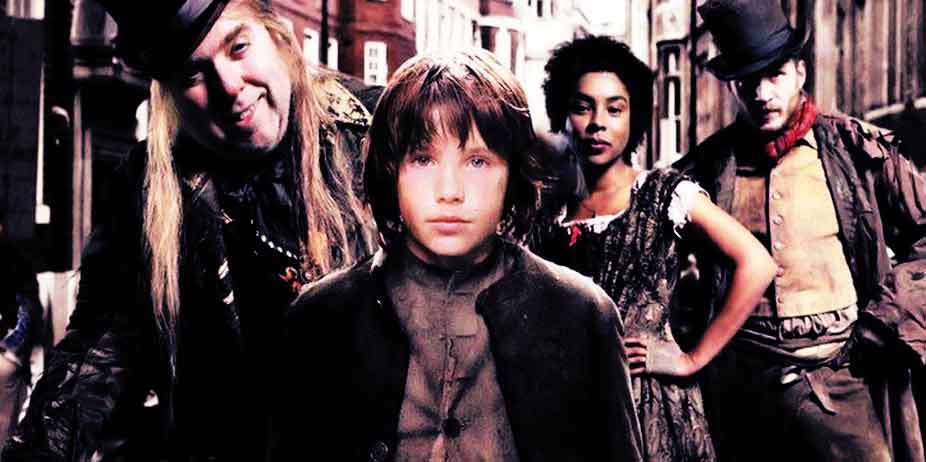
Oliver Twist (2007)
There have been more adaptations of Oliver Twist than any other Dickens novel. From plays in the west end to television and big screen movies to musicals and even a cartoon representation in a Disney film, time and again this story has been told and retold (thirty five times in all). It might therefore seem unnecessary for the BBC to tackle it again, but in truth this has become my favorite.
The only thing of value the penniless young woman has when she stumbles into the workhouse is a golden necklace, and a letter meant for the eyes of her guardian. Neither of them are returned on her death, and her child, the unfortunate Oliver Twist, is left to the care of the abusive managers, Mr. Bumble (Gregor Fisher) and Mrs. Corney (Sarah Lancashire). Ten years later, after being sold to a coffin maker, Oliver (William Miller) runs away to London and falls into the companionship of the Artful Dodger (Adam Arnold), a cunning street thief who is excessively loyal to his keeper, Fagan (Timothy Spall), a miserly Jew who has fallen on hard times. When the Dodger attempts unsuccessfully to turn Oliver into a thief, the boy is captured by the police and sentenced to a hanging. Fortunately, the man he was claimed to have wronged takes him under his wing, and Oliver becomes fond of Mr. Brownlow (Edward Fox) and his ward, Rose (Morven Christie).
Entrusted with returning some money to a bookshop, Oliver is distressed when he is taken captive by Bill Sykes (Tom Hardy), one of Fagan's bad-tempered criminal associates, who fears Oliver will "peach" on all of them to the police. It is left to Bill's abused girlfriend Nancy (Sophie Okonedo) to save the boy, when it becomes apparent that a mysterious man by the name of Monks (Julian Rhind-Tutt) is secretly behind the abduction. Though the story deviates in many respects from the novel, it does what Bleak House managed to do by completely reviving the drive of the main plot. Shot in five half hour installments, with a brilliant opening credit sequence and a surprisingly modern but impacting score, it takes a cast of well known but largely under-used British talent and puts a new twist on the story, if you'll pardon the pun.
Some of the changes made the plot much easier to follow, while others created a surprising amount of empathy for the downtrodden semi-villains of the piece. Arguably, the most tragic individual involved is Fagan, who comes to a bad end at the hands of a horrifically anti-Semitic judicial system whose meanness will leave your mouth hanging open. Bill also comes to a different end than in the book, but somehow it seems to grant him a hint more humanity. I think the most brilliant addition was Monks, who is depicted with a kind of ambitious savagery concealed behind a manipulative exterior. There is a wonderful sense of fear that accompanies his presence whenever he is around Rose, and his scenes with Mr. Bumble flicker between hilarious and shocking. He might just nudge out Bleak House's Tulkinghorn for my favorite Dickens villain if he's not careful.
For the most part, this story is kept free of troublesome content but there are thematic elements and implications that might frighten very small children. Boys appear with bloodied noses after being punished at the workhouse. Oliver is manhandled on several occasions; a girl holds him down while another boy fluctuates in his face. There is some crude humor consisting of a man being kicked in the backside; another has his privates stepped on as a boy escapes out the back door. Several people are backhanded. It's implied that someone is beaten to death, but unlike most of the other adaptations, we do not have to remain in the room while it happens. A figure is shown laying in a pool of blood. There are two hangings, inferred but unseen. From yelps, we know that a man is kicking a dog (and almost loses his life for it). Dodger finds the carcass of Fagan's crow after the police have maliciously murdered it simply because Fagan was fond of it.
There is no sexual content, but a certain amount of sensuality is present between Mr. Bumble and Mrs. Corney; the former ogles her backside in one scene, and has a peek down her dress in another (this was intentional on her part). I didn't know whether to be incredulous or laugh in their romantic scene, when instead of kissing her, Mr. Bumble proceeds to suck on her nose! Monks' sadistic desire for Rose is obvious in the way he watches her from a distance, and once manhandles her as he alludes to the fact that he desires to marry her. There are also two negative inferences of Christianity, one from one of the workhouse owners who claims God intends to punish Oliver for his "wickedness," and again when the judge implies to Fagan that he will reduce his sentence if the Jew renounces his faith and accepts Christ. This kind of blatant anti-Semitism was common in the time, and yet to see it through a modern perspective takes one aback.
Fortunately, there is also a scene at the end where Oliver and his family are shown in a church, quietly lighting candles for those who have gone on before them. Puritans of the book will not be pleased with the changes, but to me this film captured the true spirit of the book and long before the conclusion had complete won over my heart.
